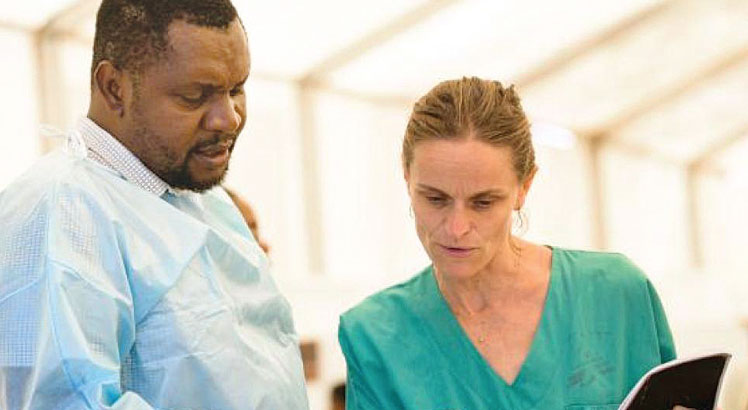Latrines flush poop into Nasolo River
In the populous Ndirande Township in Blantyre City, both residents and visitors pinch their noses to evade a stench from poop floating in Nasolo River.
Most urban rivers in Malawi turn into dumpsites as they split densely populated markets and settlements.
However, homesteads along the banks of Nasolo have hit a new low as they emptyi faeces and urine from shallow latrines into the river.
Its greenish water stink and foam as it leaves the city’s most populous township. It pours into Mudi River, which contributes a tenth of the water for the city, especially Queen Elizabeth Central Hospital (QECH).
Samuel Chimaliro says the cholera-prone city is sitting on a time bomb.
“The river used to have clear water until some 30 years ago when poor waste management, deforestation and unregulated settlements became a way of life,” he says.

To Chimaliro, the neglected water pollution bares population pressure on the environment amid negligent law enforcement.
Over the years, Nasolo has been choked by filth and pipes buried in the ground that offload poop into its way.
“This poses a threat to the environment and our health, especially in communities downstream which are hit hard by cholera outbreaks,” Chimaliro states.
Walking on Nasolo riverbanks on August 4, the smelly pipes sticking into Nasolo’s course flashed past.
The Water Resources Act and Environment Management Act outlaw building homes, farming and economic activity within 30 metres of natural waterways.
However, authorities seldom enforce these environmental protection laws as vigilantly as the police make traffic regulations work.
Hannah Kazonde, 40, fears for her family amid waterborne disease outbreaks.
Until July this year, Blantyre was one of the top hotspots for the country’s deadliest cholera outbreak, which claimed more than 1 760 lives from about 60 000 patients in 15 months.
Ndirande recorded nine deaths from 904 patients, reports Natasha Kainga, integrated disease surveillance and response coordinator at Blantyre District Health Office. This represents nearly a tenth of Blantyre’s count of about 9 000.
Kazonde, a mother of three, says: “It is not surprising that our colleagues downstream were more devastated by cholera than us. The stinking river puts our lives in danger,” she says.
The pipes draining pit latrines into rivers call for expansion of sewage systems in Malawi.
Blantyre City is served by a scanty but leaky system rusting and shrinking in disrepair.
Chimaliro, a father to three, says his low-lying community is at the receiving end of human waste flushed downstream during the rainy season.
In March this year, Cyclone Freddy reduced homes and toilets to rubble, dumping an array of waste around the rubble of Chimaliro’s home.
He says the low-income earners pushed to Nasolo riverbanks cannot afford cement for resilient toilets and private trucks for emptying pit latrines.
“Draining human waste from pit latrines into the river is no different from open defaecation. It poses a threat to people along the river,” says the plumber.
Malawi has adopted community-led total sanitation, dotting rural communities with donor-funded billboards proclaiming: “Ife tasiya kunyera ku tchire (we have stopped defaecating in the open).
However, efforts to combat equally risky forms of open defaecation in urban settings remain as scanty as investment in fixing and expanding the leaky sewage pipelines.
According to Blantyre district environmental health officer Penjani Chunda, negligence and low ownership of waste management is a public health hazard.
“It’s no surprise that Ndirande registered the highest in Cholera cases in Blantyre. It’s because of the deliberate desludging of latrines into the river without thinking of its disastrous consequences,” he says
The public health official urges law enforcers, councils and the Ministry of Water and Sanitation to make laws against such “ticking bombs” work.
Water for All country director Kate Harawa calls for coordinated efforts to end water pollution likely to undo national strides to achieve the global Sustainable Development Goal six: Safe water, sanitation and hygiene for all.
“Government and development partners need to collaborate and invest more to find alternate solutions to address sanitation problems and economic opportunities from it,” she says.
Minister of Water and Sanitation Abida Mia says government has started relocating people from riverbanks and testing water for possible pollution.
“If sewage is found, the residents get penalised,” she says. “This problem does not only affect the environment and health, but also strains the economy.”





